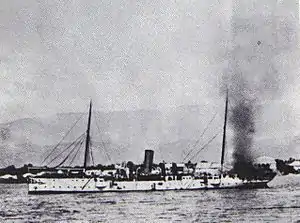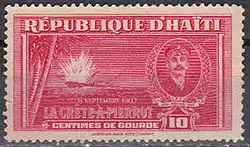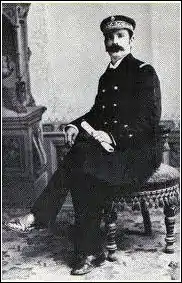Haitian gunboat Crête-à-Pierrot
Crête-à-Pierrot was a gunboat in the Haitian Navy. It was destroyed by Admiral Hammerton Killick in 1902 to prevent it falling into the hands of a German warship.
 | |
| History | |
|---|---|
| Name: | Crête-à-Pierrot |
| Builder: | Earle's Shipbuilding & Engineering Co, Hull (Yard 396) |
| Launched: | 7 November 1895 |
| Commissioned: | 1896 |
| Out of service: | 1902 |
| Fate: | Destroyed to prevent capture |
| General characteristics | |
| Type: | Gunboat |
| Displacement: | 950 tons |
| Installed power: | Triple expansion steam engines |
| Propulsion: | 1 × propeller |
| Speed: | 16 knots (30 km/h) |
| Complement: | 175 |
| Armament: |
|
Description
The ship displaced 950 tons. It was powered by a triple expansion steam engine driving a single screw propeller, giving a speed of 16 knots (30 km/h). Armament comprised a 16 cm, 12 cm and four 10 cm guns, four Nordenfelt machine guns and two Maxim machine guns.[1][2]
Commission
The Haitian Government commissioned an armed cruiser to be designed by Sir E J Reed and built by Earle's Shipbuilding & Engineering Co at Hull, Yorkshire, England.[1][2][3] The ship was launched as Crête-à-Pierrot, named for the revolutionary battle of Crête-à-Pierrot, on 7 November 1895.[2] After arming in France, it was added to the Haitian Navy in 1896 and considered the Navy's crown jewel, the best of the four ships it possessed at the time.[3]
Crête-à-Pierrot's first commander was Captain Gilmour, from Scotland, who served under contract to Haiti.[3]
Destruction

In 1902 Haiti was enveloped in a civil war over who would become president after the sudden resignation of Tirésias Simon Sam. Crête-à-Pierrot was controlled by Admiral Hammerton Killick and supporters of Anténor Firmin and was used to blockade ports where Pierre Nord Alexis was gathering troops.[4] There was a plan to use Crête-à-Pierrot to transport Firmin to Port-au-Prince while Jean Jumeau marched on Port-au-Prince by land.[5]
In September 1902, Crête-à-Pierrot seized a German ammunition ship, Markomannia en route to provide ammunition to Alexis' forces.[5] Alexis asked Germany for help subduing a pirate ship.[4] In response, Germany sent the gunboat SMS Panther to find and capture Crête-à-Pierrot.[5]
On 6 September, Crête-à-Pierrot was in port at Gonaïves, with Killick and most of the crew on Shore leave when Panther appeared.[6] Killick rushed aboard and ordered his crew to abandon ship.[6] When all but four crew members had evacuated the ship[5] Killick, inspired by the tale of Captain LaPorte, wrapped himself in a Haitian flag, fired the aft magazine, and blew up the ship rather than let the Germans take her.[6][7] Killick and the remaining four crew members went down with the ship.[6]
An hour later, Panther fired thirty shots at Crête-à-Pierrot to finish it off, then sailed away.[7] The ship's rifles and machine guns were salvaged, along with the bodies of the crew that remained on board.[7]
Gallery
.jpg.webp) SMS Panther, the German ship sent to capture Crête-à-Pierrot.
SMS Panther, the German ship sent to capture Crête-à-Pierrot. Admiral Hammerton Killick, who destroyed the ship rather than let the Germans have her.
Admiral Hammerton Killick, who destroyed the ship rather than let the Germans have her. Pierre Nord Alexis, the 19th President of Haiti.
Pierre Nord Alexis, the 19th President of Haiti. Anténor Firmin. The ship was destroyed in civil war over who would become the 19th President of Haiti.
Anténor Firmin. The ship was destroyed in civil war over who would become the 19th President of Haiti. Haitian gunboat Crête-à-Pierrot on 6 September 1902 at the Port of Gonaives shortly before the sinking by SMS Panther.
Haitian gunboat Crête-à-Pierrot on 6 September 1902 at the Port of Gonaives shortly before the sinking by SMS Panther. The Haitian gunboat Crete-à-Pierrot sinking after bombardment by SMS Panther in the port of Gonaives 6 September 1902.
The Haitian gunboat Crete-à-Pierrot sinking after bombardment by SMS Panther in the port of Gonaives 6 September 1902. Wreck of the Haitian gunboat Crete-à-Pierrot in the port of Gonaives on 6 September 1902.
Wreck of the Haitian gunboat Crete-à-Pierrot in the port of Gonaives on 6 September 1902.
References
- "The Sinking of a Haitian Gunboat". The Times (36868). London. 9 September 1902. col A, p. 3.
- Neal, William George, ed. (1 December 1895). "Armed Cruiser for the Haytian Government". The Marine Engineer. XXII: 355. Retrieved 25 February 2015.
- Hesketh-Prichard, Hesketh Vernon (October 15, 2012). Where Black Rules White: A Journey Through and About Hayti. Wermod and Wermod Publishing Group. pp. 77–84. ISBN 9780956183583.
- Dubois, Laurent (January 3, 2012). Haiti: The Aftershocks of History. Macmillan. ISBN 9780805095623.
- Smith, Matthew (October 20, 2014). Liberty, Fraternity, Exile: Haiti and Jamaica after Emancipation. UNC Press Books. ISBN 9781469617985.
- Haiti: A Slave Revolution: 200 years after 1804. International Action Center. September 2004. ISBN 978-0974752105. Archived from the original on 13 May 2008. Retrieved 3 February 2015.
- "Killick Went Down with His Warship" (pdf). The New York Times. September 11, 1902. Retrieved 3 February 2015.